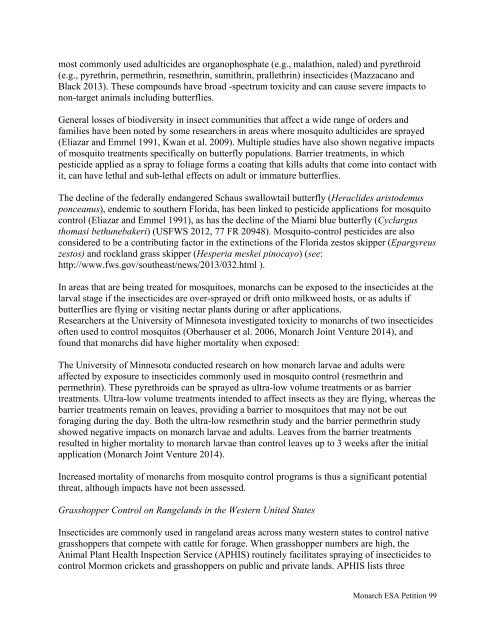monarch-esa-petition-final_61585
monarch-esa-petition-final_61585
monarch-esa-petition-final_61585
You also want an ePaper? Increase the reach of your titles
YUMPU automatically turns print PDFs into web optimized ePapers that Google loves.
most commonly used adulticides are organophosphate (e.g., malathion, naled) and pyrethroid<br />
(e.g., pyrethrin, permethrin, resmethrin, sumithrin, prallethrin) insecticides (Mazzacano and<br />
Black 2013). These compounds have broad -spectrum toxicity and can cause severe impacts to<br />
non-target animals including butterflies.<br />
General losses of biodiversity in insect communities that affect a wide range of orders and<br />
families have been noted by some researchers in areas where mosquito adulticides are sprayed<br />
(Eliazar and Emmel 1991, Kwan et al. 2009). Multiple studies have also shown negative impacts<br />
of mosquito treatments specifically on butterfly populations. Barrier treatments, in which<br />
pesticide applied as a spray to foliage forms a coating that kills adults that come into contact with<br />
it, can have lethal and sub-lethal effects on adult or immature butterflies.<br />
The decline of the federally endangered Schaus swallowtail butterfly (Heraclides aristodemus<br />
ponceanus), endemic to southern Florida, has been linked to pesticide applications for mosquito<br />
control (Eliazar and Emmel 1991), as has the decline of the Miami blue butterfly (Cyclargus<br />
thomasi bethunebakeri) (USFWS 2012, 77 FR 20948). Mosquito-control pesticides are also<br />
considered to be a contributing factor in the extinctions of the Florida zestos skipper (Epargyreus<br />
zestos) and rockland grass skipper (Hesperia meskei pinocayo) (see:<br />
http://www.fws.gov/southeast/news/2013/032.html ).<br />
In areas that are being treated for mosquitoes, <strong>monarch</strong>s can be exposed to the insecticides at the<br />
larval stage if the insecticides are over-sprayed or drift onto milkweed hosts, or as adults if<br />
butterflies are flying or visiting nectar plants during or after applications.<br />
Researchers at the University of Minnesota investigated toxicity to <strong>monarch</strong>s of two insecticides<br />
often used to control mosquitos (Oberhauser et al. 2006, Monarch Joint Venture 2014), and<br />
found that <strong>monarch</strong>s did have higher mortality when exposed:<br />
The University of Minnesota conducted research on how <strong>monarch</strong> larvae and adults were<br />
affected by exposure to insecticides commonly used in mosquito control (resmethrin and<br />
permethrin). These pyrethroids can be sprayed as ultra-low volume treatments or as barrier<br />
treatments. Ultra-low volume treatments intended to affect insects as they are flying, whereas the<br />
barrier treatments remain on leaves, providing a barrier to mosquitoes that may not be out<br />
foraging during the day. Both the ultra-low resmethrin study and the barrier permethrin study<br />
showed negative impacts on <strong>monarch</strong> larvae and adults. Leaves from the barrier treatments<br />
resulted in higher mortality to <strong>monarch</strong> larvae than control leaves up to 3 weeks after the initial<br />
application (Monarch Joint Venture 2014).<br />
Increased mortality of <strong>monarch</strong>s from mosquito control programs is thus a significant potential<br />
threat, although impacts have not been assessed.<br />
Grasshopper Control on Rangelands in the Western United States<br />
Insecticides are commonly used in rangeland areas across many western states to control native<br />
grasshoppers that compete with cattle for forage. When grasshopper numbers are high, the<br />
Animal Plant Health Inspection Service (APHIS) routinely facilitates spraying of insecticides to<br />
control Mormon crickets and grasshoppers on public and private lands. APHIS lists three<br />
Monarch ESA Petition 99




